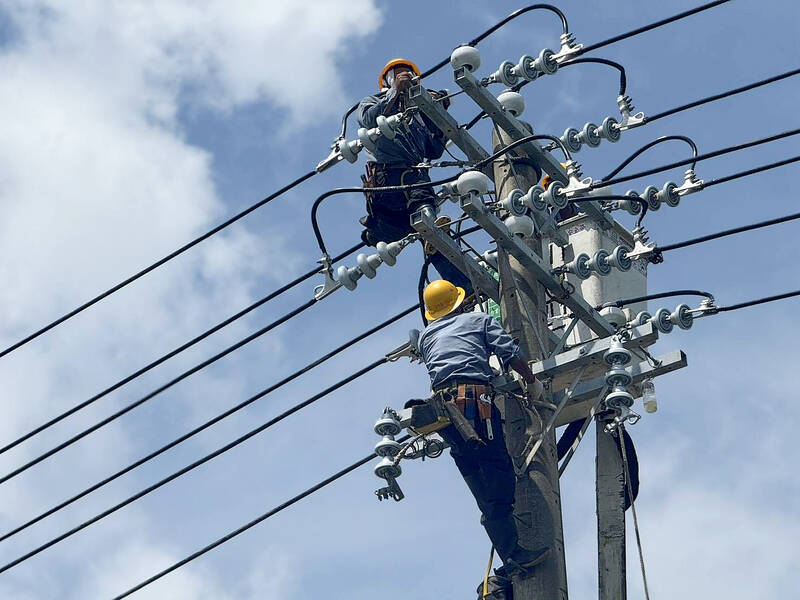The Ministry of Economic Affairs yesterday revised down the nation’s power consumption growth forecast to 1.7 percent over the next decade, as major investments from semiconductor firms and into artificial intelligence (AI) technologies were diverted mainly overseas.
That compares with a forecast compound annual growth rate of 2.8 percent during a 10-year period from last year to 2033.
The revision is also due to a lower base this year, as power consumption declined in the first half of this year as a business slump in the traditional sector cut electricity usage, Energy Administration Acting Director-General Lee Chun-li (李君禮) told a news conference.

Photo courtesy of Taiwan Power Co
The government’s energy conservation initiatives also helped, the official said.
The measure is expected to save 20.6 terawatt-hours (TWh) of electricity over four years, or about 5TWh annually, Lee said.
The revised power consumption growth forecast is comparable to rival countries’ projected growth — 0.6 percent in Japan and 1.8 percent in South Korea, Lee said.
Although Taiwan’s GDP expanded 6.75 percent in the first half of this year, power consumption dropped 1.1 percent from a year earlier, the ministry said.
The growth of 7 to 8 percent in power consumption of heavy users such as semiconductor firms was offset by declines of 2 to 10 percent in heavy industries such as steel, cement, papermaking and petrochemicals, resulting in a decline during the period, he said.
The Energy Administration expects peak load demand to expand to about 42.2GW at night in 2030 from 36.88GW this year.
State-run Taiwan Power Co (Taipower, 台電) would focus on diversifying green energy sources to help ensure stable and sufficient electricity supply, Lee said.
The company is expanding solar energy and wind power supply, accelerating the development of geothermal and small hydropower projects to maximize the use of renewable energy, he said.
The ministry reiterated that renewable energy is to account for 20 percent of total power supply in November next year, after the government pushed back the goal three times.
By the end of 2030, green energy is projected to make up about 30 percent of total power supply, up from last year’s estimate of 25 percent, as the government plans to expand geothermal, biomass, small hydropower and marine energy capacities, the report said.
Taipower projected its reserve margin would improve to 19.6 percent after 2030 from 14.2 percent this year. That figure is expected to climb to 27.7 percent in 2033, indicating that its electricity capacity would outgrow demand, or capacity adequacy, it said.

In Italy’s storied gold-making hubs, jewelers are reworking their designs to trim gold content as they race to blunt the effect of record prices and appeal to shoppers watching their budgets. Gold prices hit a record high on Thursday, surging near US$5,600 an ounce, more than double a year ago as geopolitical concerns and jitters over trade pushed investors toward the safe-haven asset. The rally is putting undue pressure on small artisans as they face mounting demands from customers, including international brands, to produce cheaper items, from signature pieces to wedding rings, according to interviews with four independent jewelers in Italy’s main

Japanese Prime Minister Sanae Takaichi has talked up the benefits of a weaker yen in a campaign speech, adopting a tone at odds with her finance ministry, which has refused to rule out any options to counter excessive foreign exchange volatility. Takaichi later softened her stance, saying she did not have a preference for the yen’s direction. “People say the weak yen is bad right now, but for export industries, it’s a major opportunity,” Takaichi said on Saturday at a rally for Liberal Democratic Party candidate Daishiro Yamagiwa in Kanagawa Prefecture ahead of a snap election on Sunday. “Whether it’s selling food or

CONCERNS: Tech companies investing in AI businesses that purchase their products have raised questions among investors that they are artificially propping up demand Nvidia Corp chief executive officer Jensen Huang (黃仁勳) on Saturday said that the company would be participating in OpenAI’s latest funding round, describing it as potentially “the largest investment we’ve ever made.” “We will invest a great deal of money,” Huang told reporters while visiting Taipei. “I believe in OpenAI. The work that they do is incredible. They’re one of the most consequential companies of our time.” Huang did not say exactly how much Nvidia might contribute, but described the investment as “huge.” “Let Sam announce how much he’s going to raise — it’s for him to decide,” Huang said, referring to OpenAI

The global server market is expected to grow 12.8 percent annually this year, with artificial intelligence (AI) servers projected to account for 16.5 percent, driven by continued investment in AI infrastructure by major cloud service providers (CSPs), market researcher TrendForce Corp (集邦科技) said yesterday. Global AI server shipments this year are expected to increase 28 percent year-on-year to more than 2.7 million units, driven by sustained demand from CSPs and government sovereign cloud projects, TrendForce analyst Frank Kung (龔明德) told the Taipei Times. Demand for GPU-based AI servers, including Nvidia Corp’s GB and Vera Rubin rack systems, is expected to remain high,